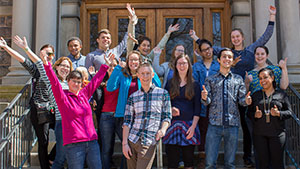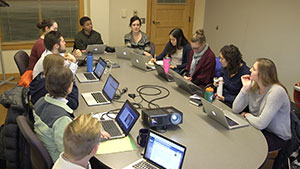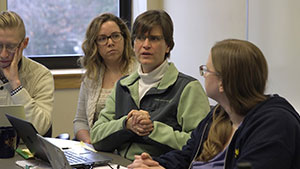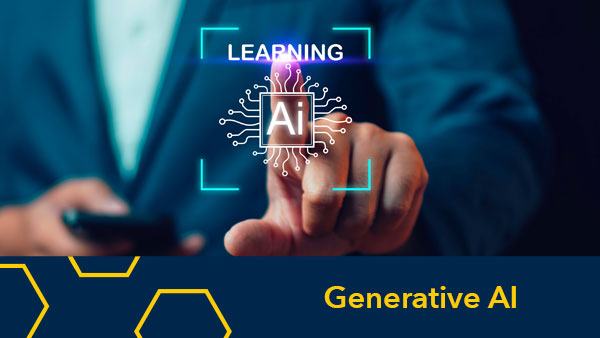This article was originally posted on 7/12/2017 on the Coursera Blog
Rebecca Quintana, Learning Experience Designer
@rebquintana
What would it look like for university students to be the content creators for a Coursera social impact campaign course? At the University of Michigan, Dr. Michaela Zint, Professor of Environmental Education & Communication in the University’s School for Environment and Sustainability and School of Education, and her students partnered with the Office of Academic Innovation and the University’s Center for Research on Teaching and Learning to explore the idea of “an online course by students.” The goal of the initiative was to investigate how students could be transformed from consumers to developers of online content.
Dr. Michaela Zint, a noted proponent of environmental and sustainability education, explains:
“The students in our School for Environment and Sustainability are eager to learn how to educate others about climate change and how to do so effectively. In addition, research tells us that young adults from across the globe are looking for ways to best respond to this major societal challenge. Engaging students in the development of an action-oriented climate change online course therefore seemed like an appropriate way to merge these interests. Facilitating the co-creation of an online course also sounded like a lot more fun than developing an online course on my own. It was!”

Over the course of two semesters, the course team worked together to develop an online course that would become part of Coursera’s Social Impact campaign — Act on Climate: Steps to Individual, Community, and Political Action. A desired outcome of the course was that learners feel empowered to address and respond to climate change as individuals and in partnership with their communities and political leaders.
Dr. Zint’s students were motivated to sign-up for the experience by a variety of factors, including the chance to do something innovative beyond the scope of a regular class, the desire to make a difference and have a far-reaching impact, and the opportunity to learn more about online education.
Priscila Papias, master’s student at the University of Michigan, describes the factors that led to her involvement in the course:
“As someone who has been itching to find a tangible way to impact climate change widely, I quickly jumped on this opportunity to create content for an online course on climate action. In addition to helping fill in gaps in my own knowledge on climate change and climate action, this class gave me the opportunity to learn about what individuals and communities are doing throughout the nation and across the globe to respond to climate change.”
During the first semester, the class focused on topics such as online teaching and learning at scale, learner-centered course design, assessment and evaluation in online courses, universal design principles, and fostering community in online courses.
Dr. Rachel Niemer, Director of the Gameful Learning Lab within the Office of Academic Innovation, worked closely with Dr. Zint and the students during this first semester:
“We wanted to provide professional development for these future educators and practitioners that would both support the creation of this online course and provide a foundation for their future careers.”
 During the second semester, the class concentrated on tasks such as identifying primary and secondary audiences, determining topics for the course, creating a high-level outline, designing assessments and activities for the course, interviewing experts, and locating relevant and timely resources. Through a process of ongoing discussion and iteration, the course team settled on a structure that was used to guide the sequencing of course materials and assessment across the topic modules.
During the second semester, the class concentrated on tasks such as identifying primary and secondary audiences, determining topics for the course, creating a high-level outline, designing assessments and activities for the course, interviewing experts, and locating relevant and timely resources. Through a process of ongoing discussion and iteration, the course team settled on a structure that was used to guide the sequencing of course materials and assessment across the topic modules.
Bryon Maxey, Project Manager within the Office of Academic Innovation, noted the benefits of including students in the course development process:
“In my experience, this approach to online course creation is unique and allowed for truly multi-directional learning, not only for learners who will take the online course, but for the students who were central to course creation process and for the entire course team.”
As a result of the course team’s work throughout two semesters, the course contains a variety of interesting elements, such as a pledge card that online learners are encouraged to complete at the start of the course to express their commitment level, case studies of grassroots organizations, accounts from students that describe their personal experiences with making personal change, and a series of practical recommendations of how online learners can take action at the personal, community, and national (and global) level.
Dr. Rebecca Quintana, Learning Experience Designer within the Office of Academic Innovation and member of the course design team, reflects:
“Now that the course elements have been finalized, we can see that there is incredible richness in the resources that the students have put together. What is even more exciting, is that the structure of the course will allow online learners to engage with materials in ways that speak to their personal areas of interest and desired levels of commitment.”
 With the course set to launch, the course team is excited to see what the impact of their work will be. Dr. Zint explains:
With the course set to launch, the course team is excited to see what the impact of their work will be. Dr. Zint explains:
“My students and I cannot wait so see what our [online] learners think and what impact they will have as individuals, members of their communities, and politically.”
The course’s innovative model was recognized by the University of Michigan’s Campus of the Future initiative and Dr. Zint’s students were invited to participate in a university-wide colloquium on how to reinvent the university in the 21st century.
Act on Climate: Steps to Individual, Community, and Political Action is part of the Social Impact campaign and is receiving new enrollments daily.


